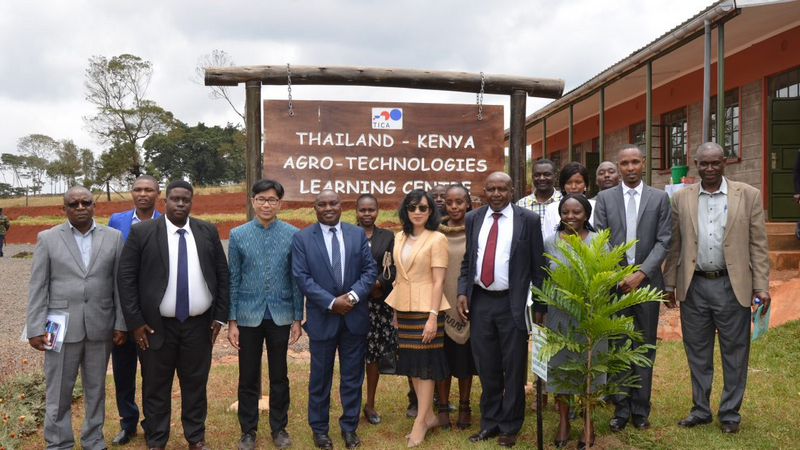Kenya has recently entered into a promising three-year bilateral agreement with the Royal Government of Thailand to improve crop and animal production practices in the East African nation. The agreement, signed on July 9 last year, outlines a comprehensive collaboration where the Thai government will share its knowledge and expertise in modern and emerging agricultural technologies with Kenyan scientists. The focus is on fostering a knowledge transfer partnership through training programs facilitated by existing state institutions.
Thai Ambassador’s Optimism
Thai Ambassador to Kenya, Ms Sasirit Tangulrat, expressed optimism about the partnership during a recent event at the Nyeri Kenya School of Agriculture. The occasion involved the handing over assorted agricultural equipment and exhibition materials to the center. Ambassador Tangulrat highlighted the urgency of addressing Kenya’s current food crisis, exacerbated by six consecutive seasons of failed rains.
“The Royal Thai Embassy engaged them (Kenya School of Agriculture) to set up this center two years ago to promote bilateral cooperation, particularly in the field of agriculture,” she explained. “We agreed to help the Kenya School of Agriculture establish ground technology aimed at giving value addition to crops such as bananas and vegetables, as well as soil health, irrigation water management, and many more.”
Thai-Kenia Training Plans
As part of the collaboration, the Thai government plans to dispatch a team of top crop scientists to Kenya in May for a two-week session. During this period, they will conduct training sessions on improved farming technology for Kenyan agriculture students. Notably, after the completion of training, one Thai scientist will remain in Kenya for two years to ensure the successful implementation of the program and the dissemination of skills to farmers across the country.
Ambassador Tangulrat emphasized that the training’s ultimate goal is to leave a lasting impact on Kenya’s approach to food security, especially considering the challenges posed by climate change. She expressed confidence that sharing Thailand’s best farming practices, supported by practical technology, will significantly benefit Kenyan farmers and contribute to alleviating issues related to drought and climate change.
Nowadays, this is only one of the examples of Thailand-Kenia collaboration. Moreover, this collaboration can extend not only to agricultural practices but is also symbolic of the broader partnership between the two nations. Beyond agriculture, it is noteworthy that Thai online casinos have gained popularity in Kenya, reflecting a growing cultural exchange and economic ties between the two countries. For instance, on this website, Thaicasinocenter has rounded up the best free credit and online casinos and sportsbooks with great bonuses. So this company has many ideas to share with African colleagues and maybe will invest in this sphere in Kenya.
Joseph Muhunyu, the Secretary of the Ministry of Agriculture, praised the Thai government’s initiative, highlighting the need for a paradigm shift in Kenyan farming practices. He identified improved farming technology and addressed post-harvest losses through investment in value addition as crucial areas that will enhance food production and boost farmers’ earnings.
“We are happy that this being a training institution, what we are targeting is technology transfer. We start with a few, then the knowledge can be extended,” said Muhunyu. He specifically pointed out the significance of the technology in Nyeri, where bananas are abundant, emphasizing its potential to add value to banana produce and reduce post-harvest wastage.
Donations and Support
The collaboration also involves donations to the Kenya School of Agriculture, including a walking tractor, soil testing kits, and organically prepared soil improvement additives.
Kenya is currently grappling with one of its most severe food crises in decades, with over 5.3 million people on the brink of a humanitarian crisis due to six consecutive failed rain seasons. In response, the government has initiated the distribution of relief food to affected counties, with some leaders urging the declaration of the current drought as a national disaster.
World Food Programme Representative and Country Director for Kenya, Lauren Landis, stressed the importance of global support in relieving starving communities. However, she also called for a shift in alternative food-rearing mechanisms, including adopting drought-resistant crops and water-efficient farming techniques. Landis emphasized the need for comprehensive agricultural changes, such as the production of more nutritious crops, improved post-harvest storage, enhanced processing, and reduced food losses, to address Kenya’s increasing vulnerability to dry and drought-prone climates.
Conclusion
The collaboration between Kenya and Thailand signifies a valuable step towards addressing Kenya’s pressing food crisis. The exchange of agricultural knowledge and technology is expected to empower Kenyan farmers and contribute to sustainable solutions in the face of climate challenges. Two countries are seeking other spheres for discussing further collaboration, including online casinos and sportsbooks. But this will be only the next step. At the same time, now the partnership reflects the shared commitment of both nations to foster international cooperation for the greater good of global food security.
